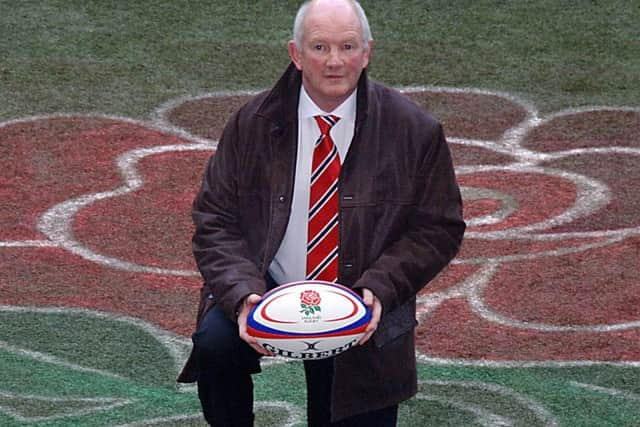Ex-England coach says Finn Russell holds key to Calcutta Cup


“I think things changed during the 2015 World Cup,” says Ashton. “It was very evident that some sides were having a large amount of success playing a game that was far more dynamic and expansive than some other sides. There has been a shift in many teams’ approach to the game.”
Not least Scotland, he could have added, who have been in the vanguard of those driving European rugby to new, more adventurous places. How Ashton must wish he had a tracksuit and whistle now. A friend and student of both Pierre Villepreux and Carwyn James, two revolutionary coaches of an earlier era, Ashton always was the thinking man’s coach and listening to him talk today, he still is.
Advertisement
Hide AdAdvertisement
Hide AdFrom the start he recognised the need for players to take control of their own performances, an impossible task when they were being spoon fed umpteen phases of play at a time. As one pundit said of Ashton, “he allows good players to play well”, which is pretty much all you can ask.


I first bumped into him 20 odd years back when we were both watching Newcastle play Harlequins (I think) and I questioned the brouhaha surrounding the latest teenage stand-off sensation. Ashton took me by the metaphorical hand and guided me through the A-Z of why Jonny Wilkinson would become one of the greats. He saw the potential in the youngster and he sees similar things in Finn Russell.
“When I first saw him play a couple of years ago I thought, wow, this guy offers something different!” says Ashton of Scotland’s mercurial stand-off. “He just looks different for a start. All sorts of things went wrong at times for him but when things did go right he can do things that are absolutely brilliant.
“He seems to have matured a lot over the last two seasons in terms of understanding what international rugby is about and he is a far more composed player now than he was but he hasn’t lost that sense of mischief, adventure, enjoyment, you very often catch him with a little wry grin on his face when he’s done something exceptionally well or something not quite so good.
“So he is obviously out there enjoying life and I think that in key positions like that you need a sense of humour to keep everything in perspective.


“I suspect there are aspects of the game that really don’t interest him at all but when he’s on the ball and can influence the outcome he switches and comes alive. Daniel Carter was one with that laconic style. He seemed to say, ‘what am I doing here?’ and then he saw an opportunity and he’d manufacture two or three try scoring opportunities.”
The 70-year-old Ashton currently mentors football coaches, Manchester United one of his clients. He works mostly with academy coaches, which is probably a good thing as it is difficult to picture Jose Mourinho soaking up the quiet Lancastrian’s wisdom however much good it might do him. Anyway football coaches, according to Ashton, share many of the same problems as rugby ones, which makes sense.
The former England coach is also a fan of rugby’s very own special one and would have Stuart Hogg starting for the Lions in New Zealand this summer provided, he warns, that the touring team are going over there to win, rather than just trying not to lose matches. And with the firepower of Hogg at the back, he gives Scotland a counter-punchers chance next weekend.
Advertisement
Hide AdAdvertisement
Hide Ad“I think Scotland have shown this season that they are a really good opportunistic rugby side,” says the engaging Englishman. “A side that is always looking to take chances when they are available. They maybe haven’t always had the players to do that but now they are pretty good at the breakdown, they turn ball over, they are very good in transition, turning defence to attack, and they are good on counter attack with the likes of Stuart Hogg.
“Rather than having the ten and 12 have a controlling influence in the middle of the field, I think Scotland have based their plan on the game breaking up and having far less structure in it where their accuracy and their willingness to play has paid dividends.
“What they are very good at, and they haven’t always done this in the past, is recognising where the space is when they get into the [opposition] 22. The space tends to be a bit wider out than a lot of players recognise but now that Scotland have firepower and try scorers out there they tend to move the ball to those areas as quickly as possible.”
Scotland have some new tricks up their sleeve but they also have some old problems that hang about this team like a bad smell. The set scrum is one of them and the Scottish forwards found the going hard in Paris but face a similar sized English pack on Saturday.
“It will depend on how much go-forward ball Scotland can generate if they are on the back foot from one of the two set pieces,” said Ashton referencing Scotland’s scrum problems. “Billy Vunipola will start for Sarries this afternoon and he’s been a talisman for England over the past year in terms of generating go forward. He could be a key figure in the game.”
Might the Scots kick the ball a little more next weekend to avoid the English blitz defence? “If the potential problems do emerge up front why would they want to kick ball away?” asks Ashton. “I suspect Scotland’s best chance is to keep ball in hand and work hard to make things happen from there and if they do kick ball maybe kick to regain possession.”
So take a leaf from Joe Schmidt’s tactics that beat the All Blacks in Chicago, I suggest, and don’t give the bastards the ball, if I am allowed to say that?
“You are allowed to say that. It’s a pretty good maxim,” replies Ashton. “I am staggered sometimes in the modern game how many sides are happy to kick ball away when they feel that the attack is starting to slow down. Things are going so well when Scotland get an opportunity to play that they need to continue along that path.
Advertisement
Hide AdAdvertisement
Hide Ad“I think the forward power of England will probably tell in the end but I am saying that with far less certainty than I would have done before the tournament started.
“Neither England or Scotland have put a full 80 minutes together yet in the Six Nations and one of them may do that next weekend. Obviously from my point of view I hope it’s England but if Scotland manage then it could be a very, very interesting game.”